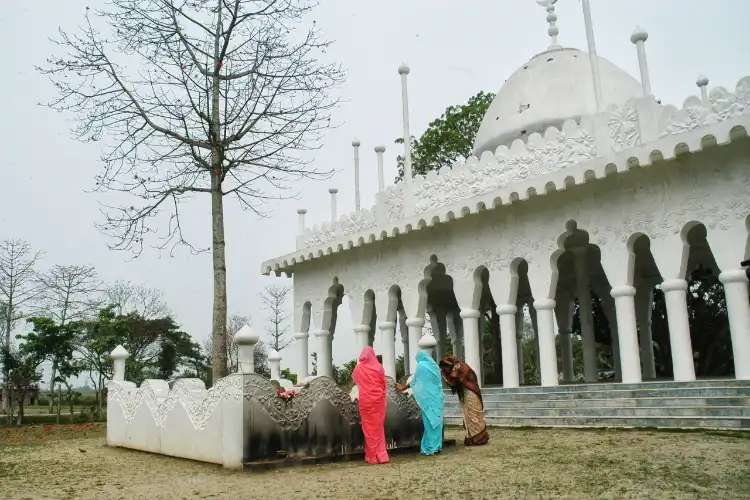Unveiling the Mystique of Ajan Faquir Dargah
Table of Contents

The Ajan Faquir Dargah, nestled amidst the serene landscape of Assam, stands as a testament to centuries of spiritual devotion and cultural fusion. This sacred mausoleum, located near modern Sibsagar town, holds a captivating history that intertwines faith, unity, and resilience.
A Glimpse into the Past
In the 17th century, a Muslim reformer and saint named Ajan Fakir arrived in Assam. Born as Shah Miran, he hailed from Baghdad (or possibly Badaun in western Uttar Pradesh) and embarked on a transformative journey. Ajan Fakir’s mission extended beyond religious boundaries; he sought to unify the diverse people of the Brahmaputra Valley.
A Beacon of Unity
Ajan Fakir’s influence transcended mere religious teachings. His marriage to an Ahom woman of high social standing exemplified his commitment to bridging cultural gaps. Fluent in the local language, he composed spiritual songs known as Zikirs, resonating with the hearts of Assamese devotees.
The Conspiracy Unveiled
Yet, every tale carries its share of adversity. Enter Rupai Baruah Dadhora, an Ahom official who harbored enmity toward Ajan Fakir. Convinced that Ajan was a Mughal spy, Rupai Baruah orchestrated a plot against him. The dramatic moment when Ajan allegedly let his eyes drop into earthen pots to avoid having them plucked out remains etched in history.
A Legacy Preserved
Despite the conspiracy, Ajan Fakir’s legacy endured. The alarmed Ahom king granted him land at Soraguri Chapari, a spot on the Brahmaputra’s bank. Here, a matha (monastery) was erected in his honor. Today, Soraguri Chapari hosts an annual urs (religious gathering), drawing pilgrims seeking solace and blessings.
The Zikirs’ Echo
Ajan Fakir’s spiritual influence reverberates through his compositions—the Zikirs. These devotional chants, drawn from the essence of the Holy Quran, continue to inspire generations. Although he is credited with composing 160 Zikirs, only 90 survive, each carrying a piece of his soul.
Historical Context: The Journey of Ajan Fakir
Origins and Arrival
- Ajan Fakir, originally known as Shah Miran, emerged from distant lands—Baghdad or perhaps Badaun in western Uttar Pradesh.
- In the 17th century, he embarked on a transformative journey that led him to the serene Sibsagar area of Assam.
Unifying the Brahmaputra Valley
- Ajan Fakir’s mission extended beyond religious boundaries. His arrival in Assam marked a pivotal moment.
- Fluent in the local language, he connected with the people, bridging cultural gaps and unifying the diverse communities of the Brahmaputra Valley.
The Legacy Takes Root
- His marriage to an Ahom woman of high social standing exemplified his commitment to harmony.
- Ajan Fakir’s spiritual influence resonated through the compositions of Zikirs, devotional chants drawn from the essence of the Holy Quran.
The Conspiracy
- Yet, adversity loomed. Rupai Baruah Dadhora, an Ahom official, harbored enmity toward Ajan Fakir.
- Accused of being a Mughal spy, Ajan faced a dramatic moment when he allegedly let his eyes drop into earthen pots to avoid having them plucked out.
Soraguri Chapari: A Sacred Site
- Despite the conspiracy, Ajan Fakir’s legacy endured. The alarmed Ahom king granted him land at Soraguri Chapari, along the Brahmaputra’s bank.
- Here, a matha (monastery) was erected in his honor, and an annual urs (religious gathering) draws pilgrims seeking blessings.
Ajan Fakir’s Journey: Bridging Worlds
Arrival in Assam
- Shah Miran, later known as Ajan Fakir, embarked on a transformative voyage from distant lands—Baghdad or perhaps Badaun in western Uttar Pradesh.
- Accompanied by his brother Shah Navi, Ajan Fakir arrived in the serene Sibsagar area of Assam.
- His mission extended beyond religious boundaries; he sought to unify the diverse people of the Brahmaputra Valley.
Cultural Fusion
- Fluent in the local language, Ajan Fakir connected with the hearts of Assamese devotees.
- His marriage to an Ahom woman exemplified his commitment to bridging cultural gaps.
- Through spiritual songs known as Zikirs, he wove faith and unity into Assam’s fabric.
The Conspiracy Unveiled
- Yet, adversity loomed. Rupai Baruah Dadhora, an Ahom official, harbored enmity toward Ajan Fakir.
- Accused of being a Mughal spy, Ajan faced a dramatic moment when he allegedly let his eyes drop into earthen pots to avoid having them plucked out.
Soraguri Chapari: A Sacred Legacy
- Despite the conspiracy, Ajan Fakir’s legacy endured. The alarmed Ahom king granted him land at Soraguri Chapari, along the Brahmaputra’s bank.
- Here, a matha (monastery) was erected in his honor, and an annual urs (religious gathering) draws pilgrims seeking blessings.
The Conspiracy: Enmity and Betrayal
Rupai Baruah Dadhora
- Rupai Baruah Dadhora, an influential Ahom official, emerged as Ajan Fakir’s adversary.
- Fuelled by personal animosity, Rupai Baruah orchestrated a plot against the saintly figure.
- His actions would forever alter the course of Ajan Fakir’s life.
The Accusation
- Rupai Baruah convinced the Ahom king that Ajan Fakir was a Mughal spy.
- The accusation cast a shadow over Ajan’s reputation, threatening his very existence.
- In a desperate bid to escape persecution, Ajan allegedly resorted to a dramatic act—letting his eyes drop into earthen pots.
The Dramatic Moment
- The legend goes that Ajan Fakir, faced with the prospect of having his eyes plucked out, chose this extraordinary sacrifice.
- His unwavering faith and resilience in the face of adversity left an indelible mark on Assam’s history.
Legacy Amidst Betrayal
- Despite the conspiracy, Ajan Fakir’s legacy endured.
- The alarmed Ahom king granted him land at Soraguri Chapari, where a matha (monastery) now stands in his honor.
- Soraguri Chapari remains a sacred site, drawing pilgrims during the annual urs (religious gathering).
Unique Zikirs and Spiritual Influence
Ajan Fakir’s Zikirs
Zikirs are devotional chants or remembrances in Sufi traditions. Ajan Fakir, with his deep spiritual insight, crafted Zikirs that resonated with the hearts of his followers. Here are some unique aspects of his compositions:
Mystical Poetry:
- Ajan Fakir’s Zikirs were poetic expressions of divine love and longing. He blended Assamese language with mystical themes, creating a bridge between the local culture and Sufi spirituality.
- His verses often invoked the names of Allah, emphasizing the unity of existence and the seeker’s connection to the divine.
Incorporating Quranic Verses:
- Ajan Fakir drew directly from the Holy Quran, infusing his Zikirs with sacred verses. These verses carried profound meanings and were recited during Sufi gatherings.
- By incorporating Quranic wisdom, he reinforced the spiritual teachings and encouraged inner reflection.
Universal Appeal:
- Unlike some traditional Zikirs, Ajan Fakir’s compositions transcended religious boundaries. They were accessible to people of all faiths, emphasizing love, compassion, and unity.
- His Zikirs became a unifying force, fostering interfaith harmony in Assam.
Spiritual Influence
Ajan Fakir’s Zikirs had a lasting impact on Assam’s spiritual landscape:
Community Bonding:
- Through his Zikirs, Ajan Fakir brought people together. His gatherings became spaces for communal prayer, music, and reflection.
- The shared experience of chanting Zikirs strengthened the sense of community and interconnectedness.
Inner Transformation:
- Followers believed that reciting Ajan Fakir’s Zikirs could lead to inner purification and closeness to God.
- The repetitive nature of Zikirs allowed devotees to focus their minds, transcending worldly concerns.
Legacy:
- Ajan Fakir’s legacy lives on in the hearts of those who continue to sing his Zikirs. His influence extends beyond religious boundaries, emphasizing the universal quest for spiritual truth.
FAQ’s:
What is Ajan Pir Dargah?
Ajan Pir Dargah is a sacred mausoleum located in the Saraguri Chapori region, approximately 22 km from the town of Sivasagar in Assam, India.
Who was Ajan Fakir?
Ajan Fakir, born Shah Miran, was a Sufi Syed, poet, Muslim preacher, and saint from the 17th century.
What were Ajan Fakir’s contributions?
Ajan Fakir composed Zikirs (spiritual songs) that blended Assamese language with mystical themes, bridging cultural gaps.
Where is the dargah located?
The Ajan Pir Dargah is situated near the bank of the Dikhow and Gariajan rivers in Saraguri Chapori, Assam.



